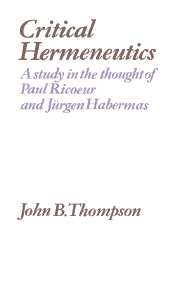Book contents
- Frontmatter
- Contents
- Foreword by Anthony Giddens
- Preface
- Introduction
- Part I Thematic exposition
- 1 Ludwig Wittgenstein and ordinary language philosophy
- 2 Paul Ricoeur and hermeneutic phenomenology
- 3 Jürgen Habermas and critical social theory
- Part II Constructive critique
- Conclusion
- Notes
- Select bibliography
- Index
2 - Paul Ricoeur and hermeneutic phenomenology
Published online by Cambridge University Press: 10 December 2009
- Frontmatter
- Contents
- Foreword by Anthony Giddens
- Preface
- Introduction
- Part I Thematic exposition
- 1 Ludwig Wittgenstein and ordinary language philosophy
- 2 Paul Ricoeur and hermeneutic phenomenology
- 3 Jürgen Habermas and critical social theory
- Part II Constructive critique
- Conclusion
- Notes
- Select bibliography
- Index
Summary
Hermeneutic phenomenology may be regarded as a philosophical tradition created by the synthesis of two Continental orientations. One of these orientations, that of hermeneutics, has a long and distinguished history which includes the work of authors such as Schleiermacher and Dilthey. The other orientation, that of phenomenology, stems largely from the investigations of Husserl, who clothed its contents in a transcendental guise. The key figures in the synthesis of these orientations are Martin Heidegger and Hans-Georg Gadamer. In recent years, an outstanding contribution to this tradition has been made by Paul Ricoeur. However, the nature of Ricoeur's contribution can be fully appreciated only if it is placed within the wider context of his voluminous work. My aim in this chapter, therefore, is to present some key ideas of hermeneutic phenomenology by tracing the evolution of the philosophy of Ricoeur. This approach necessarily underplays the contributions of other authors within this tradition, as well as those writings of Ricoeur which are not immediately relevant to the topic concerned. Nevertheless, and in spite of these limitations, I assume that a short and selective exposition of Ricoeur's philosophy will provide a clear and coherent image of hermeneutic phenomenology.
Philosophical background
Hermeneutics
Hermeneutics is a discipline that has been primarily concerned with the elucidation of rules for the interpretation of texts. The development of this discipline may be traced from the Homeric disputes of the Greek Enlightenment, through the struggle between rival theological schools in the first century A.D., to the biblical controversies of the Reformation.
- Type
- Chapter
- Information
- Critical HermeneuticsA Study in the Thought of Paul Ricoeur and Jürgen Habermas, pp. 36 - 70Publisher: Cambridge University PressPrint publication year: 1981
- 1
- Cited by



